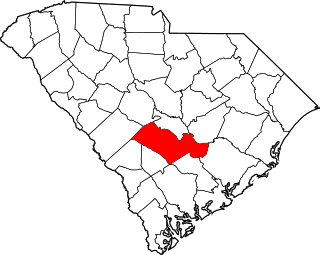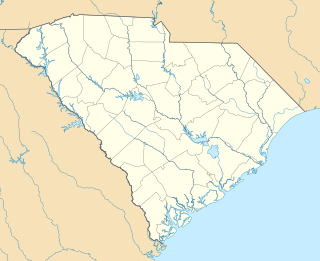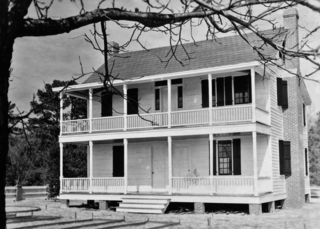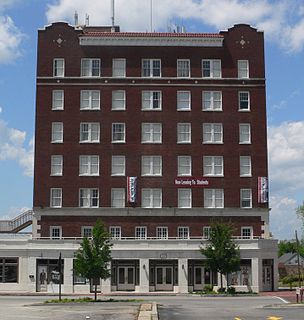
Orangeburg, also known as The Garden City, is the principal city in and the county seat of Orangeburg County, South Carolina, United States. The population of the city was 13,964 according to the 2010 United States Census. The city is located 37 miles southeast of Columbia, on the north fork of the Edisto River.

This is a list of the National Register of Historic Places listings in Orangeburg County, South Carolina.

Mt. Pisgah Baptist Church is a historic Baptist church building at 310 Green in Orangeburg in Orangeburg County, South Carolina. It was built in 1903, and is a one-story, brick Romanesque Revival-style church building. It features a prominent corner tower.

Trinity Lutheran Church is a historic Lutheran church located at 390 Hampton Street in Elloree, Orangeburg County, South Carolina. It was built in 1914, and is a one-story, granite Late Gothic Revival style cruciform plan church building. The building replaced a wood frame church built in 1889 that was destroyed by fire in 1913 after being struck by lightning. It features 16 granite and limestone buttresses and distinctive custom limestone arched door and window surrounds.

Trinity Methodist Episcopal Church is a historic Methodist Episcopal church located at 185 Boulevard NE in Orangeburg, Orangeburg County, South Carolina. It was built between 1928 and 1944, and is a two-story, brick Late Gothic Revival-style church building on a raised basement. It features a large Tudor arched stained glass window with molded cast stone surround.

Williams Chapel A.M.E. Church is a historic African Methodist Episcopal church located at 1198 Glover Street in Orangeburg, Orangeburg County, South Carolina. It was built between 1915 and 1925, and is a one-story, brick Gothic Revival-style church building on a raised basement. It features two towers on the facade with pyramidal roofs and Gothic arched stained glass windows.

F. H. W. Briggman House is a historic house located at 156 Amelia Street in Orangeburg, Orangeburg County, South Carolina. The house originally served as the home of Frederick Briggman, the first mayor of Orangeburg.

Donald Bruce House, also known as Middlepen Plantation, is a historic plantation home located near Orangeburg, Orangeburg County, South Carolina. It was originally built during the 18th century in downtown Orangeburg and was moved to Middlepen Plantation about 1837. The house is a two-story frame structure with a two-tiered front piazza. It was used as headquarters during the American Revolution at different times by both Governor John Rutledge and by the British commander, Lord Francis Rawdon.

Maj. John Hammond Fordham House is a historic home located in Orangeburg, Orangeburg County, South Carolina. It was built in 1903, and is a 1½-story, Victorian frame cottage. It was the home of Maj. John Hammond Fordham, a prominent African-American citizen of Orangeburg.

Dixie Library Building is a historic library building located at Orangeburg in Orangeburg County, South Carolina. It was built about 1850, and is a one-story, frame Classical Revival style building. It has a small rear addition, a pedimented and low-pitched gable roof, and colonnade of Tuscan order piers. The building was moved in 1912 and 1955.

South Carolina State College Historic District is a national historic district located on the campus of South Carolina State University at Orangeburg, Orangeburg County, South Carolina. The district encompasses 10 contributing buildings, 1 contributing site, and 1 contributing object at the core of the historically black university. They were constructed between 1917 and 1950, and include a variety of architectural styles including Classical Revival and International Style. Notable buildings include the separately listed Hodge Hall and Lowman Hall, along with Home Management House, Mechanical Industries Hall, and Wilkinson Hall. Also on the campus, but located outside the district, is Dukes Gymnasium.

Amelia Street Historic District is a national historic district located at Orangeburg, Orangeburg County, South Carolina. The district encompasses 15 contributing buildings in a residential section of Orangeburg. They include residences constructed between 1890 and 1929, and distinguished by large, two-story, frame houses with Victorian decorative woodwork.

East Russell Street Area Historic District is a national historic district located at Orangeburg, Orangeburg County, South Carolina. The district encompasses 55 contributing buildings in a residential section of Orangeburg. They include residences constructed between about 1850 and 1930, and includes large, one- and two-story, frame and brick houses and smaller one-story homes occupied by servants. The houses are in a variety of popular architectural styles including Victorian, Colonial Revival, and Bungalow.

Ellis Avenue Historic District is a national historic district located at Orangeburg, Orangeburg County, South Carolina. The district encompasses eight contributing buildings in a residential section of Orangeburg. They include seven residences dated to the turn of the 20th century, and a two-story brick school building (1931). The houses are in a variety of popular architectural styles including Victorian and Colonial Revival.

Treadwell Street Historic District is a national historic district located at Orangeburg, Orangeburg County, South Carolina. The district encompasses 39 contributing buildings in an African American residential section of Orangeburg. They include one-story, weatherboard frame dwellings dated between about 1890 and 1930. The houses are in a variety of popular architectural styles including Victorian and Bungalow.

Hotel Eutaw, also known as the East Russell Street Inn, is a historic hotel located at Orangeburg, Orangeburg County, South Carolina. It was designed by architect G. Lloyd Preacher and built in 1926–1927. It is a seven-story, steel-frame with brick veneer, skyscraper with an "L"-shaped plan. The front façade features a projecting one-story, six bay, cast stone entrance block.

The (Old) Orangeburg County Jail, also known as The Pink Palace, is a historic jail located at Orangeburg, Orangeburg County, South Carolina. It was built between 1857 and 1860, and is a two-story, rectangular, cement-covered brick building in the Late Gothic Revival style. It features a crenellated main tower and corner turrets. General William Tecumseh Sherman’s troops burned the building in February 1865; it was subsequently restored.

William P. Stroman House is a historic home located at Orangeburg, Orangeburg County, South Carolina. It was built in 1926, and is a two-story, Classical Revival style brick dwelling. It features a full-height porch with Doric order columns and a Spanish tile roof. Also on the property are a contributing garage and greenhouse. It was added to the National Register of Historic Places in 1996.

Tingley Memorial Hall is a historic academic building located on the campus of Claflin University at Orangeburg, Orangeburg County, South Carolina. It was built in 1908, and is a two-story, brick Classical Revival style building. The hipped and gable roof is topped by an octagonal cupola. The buildings serves as the main building on the Claflin College campus.

Dantzler Plantation, also known as Four Hole Plantation House or SunnySide House, is a historic plantation house located near Holly Hill, Orangeburg County, South Carolina. It was built about 1846–1850, and is a two-story, frame raised cottage in the Greek Revival style. It features a front portico. The main block is connected at the rear to a 1 1/2-story kitchen structure. The property includes a contributing oak allee and an entry gate.

















